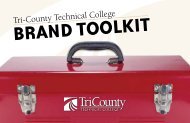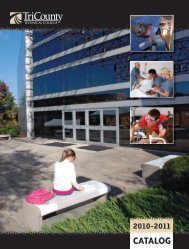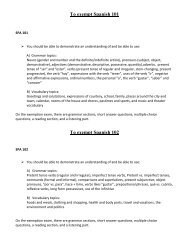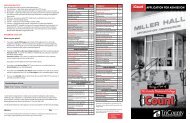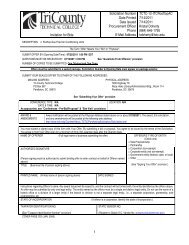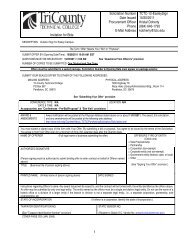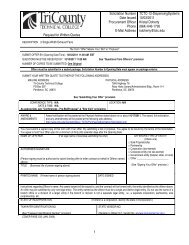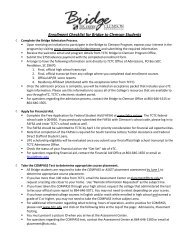TCTC Catalog - Tri-County Technical College
TCTC Catalog - Tri-County Technical College
TCTC Catalog - Tri-County Technical College
Create successful ePaper yourself
Turn your PDF publications into a flip-book with our unique Google optimized e-Paper software.
GENERAL<br />
INFORMATION<br />
Financial Information<br />
Length of Eligibility<br />
When evaluating the amount of work a student attempts<br />
and completes, it is necessary to establish a maximum<br />
number of credit hours that can be attempted in each<br />
program. This maximum equates to 150% of the minimum<br />
credit hours required to complete the program of<br />
study in which the student is enrolled. For example, a<br />
student enrolled in a 60-credit-hour program is eligible<br />
to receive financial aid until 90-credit-hours are<br />
attempted. A student who reaches this point without graduating<br />
from the program will no longer be making satisfactory<br />
academic progress and financial aid will cease.<br />
The Financial Aid Office can answer additional questions<br />
regarding the Satisfactory Academic Progress policy.<br />
for Financial Aid” for additional information.<br />
• Before withdrawing, students should contact the<br />
Financial Aid Office in Miller Hall to learn about<br />
their options and how withdrawing will affect their<br />
financial aid.<br />
If a student falls below these criteria, he or she will be<br />
placed on financial aid probation for one term. Financial<br />
Aid suspension will result if the requirements are not<br />
met after the probationary term. Satisfactory Academic<br />
Progress is evaluated at the end of each term.<br />
EARNED AID POLICY<br />
The Federal Title IV Earned Aid Policy is based on the<br />
Higher Education Reauthorization Act of 1998 and states<br />
that students must remain enrolled in college in order to<br />
earn the financial aid awarded for that specific term.<br />
Withdrawing from college can negatively impact all<br />
financial aid eligibility and can cause a student to owe<br />
funds back to those federal programs. Students must<br />
complete at least 60% of the term to earn financial aid<br />
for that term. There are several ways that federal financial<br />
aid eligibility can be affected by withdrawal:<br />
• Students may have to repay some of the financial<br />
aid funds received for that term. These programs<br />
include the Federal Pell Grant and the Supplemental<br />
Educational Opportunity Grant. This may mean<br />
balances due by the student to both the <strong>College</strong><br />
and the Department of Education. Financial Aid<br />
will perform the calculation to determine if repayment<br />
is required. This calculation cannot be<br />
performed while the student is in the office during<br />
the withdrawal process because data from other<br />
areas of the college must be gathered. Students<br />
will be informed by mail in approximately three<br />
weeks from the date of the complete withdrawal.<br />
Students must have a valid permanent address on<br />
file with the Student Records Office. If a student<br />
owes a repayment, he/she cannot receive federal<br />
financial aid funds at any college until that repayment<br />
has been made.<br />
• Students could lose academic eligibility for future<br />
financial aid. Students are required to make “satisfactory<br />
academic progress” to continue receiving<br />
aid. While withdrawals may not hurt a student’s<br />
GPA, they can hurt a student’s completion rate.<br />
See section titled “Satisfactory Academic Progress<br />
19



